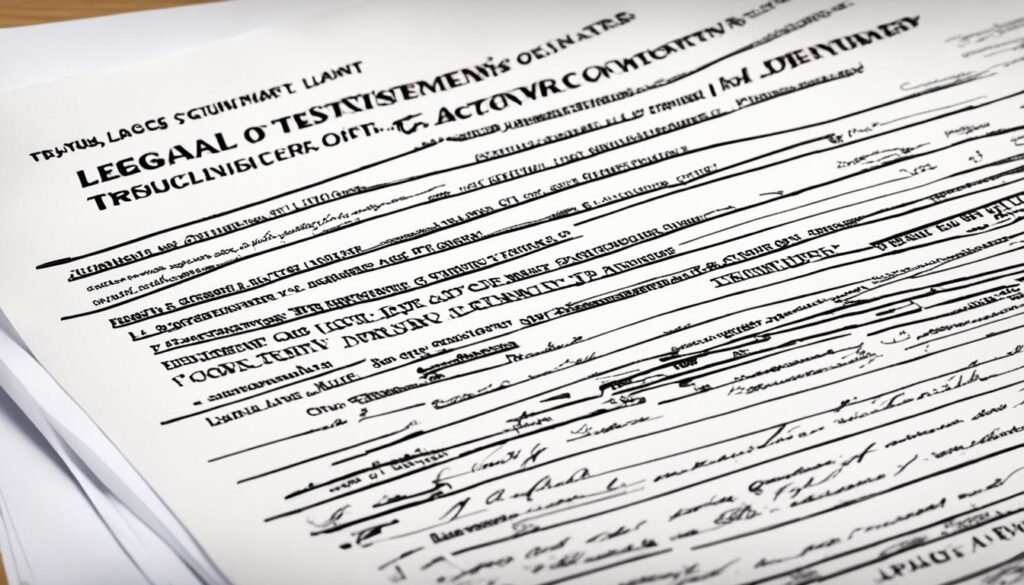Welcome to our comprehensive guide on estate planning in the legal realm. As experienced estate planning lawyers, we understand the importance of securing your financial future and protecting your loved ones. Estate planning is a crucial process that involves several essential steps and documents to ensure that your assets are distributed according to your wishes. From wills and trusts to power of attorney and healthcare directives, each document plays a pivotal role in safeguarding your legacy. Let us guide you through the estate planning process, providing you with valuable insights and practical tips to make informed decisions.
At [Your Law Firm Name], we offer a range of estate planning services tailored to your unique needs. Our team of skilled estate planning attorneys will assist you in navigating the complexities of the estate planning process with ease and precision. With our expertise, you can have peace of mind knowing that your assets will be protected and your loved ones will be taken care of.
Throughout this guide, we will delve into the intricacies of estate planning, discussing essential documents, the probate process, asset protection strategies, and much more. We will also explore the benefits of utilizing online notarization services, such as BlueNotary, to streamline the estate planning process.
Now, let’s delve into the world of estate planning and discover the key steps and considerations for a secure financial future.
Key Takeaways:
- Estate planning involves crucial steps and documents to secure your financial future.
- Wills, trusts, power of attorney, and healthcare directives are essential estate planning documents.
- Proper estate administration is critical for asset distribution and fulfilling legal obligations.
- Online notarization services like BlueNotary offer convenience and efficiency in the estate planning process.
- Consulting with a professional estate planning attorney can provide valuable guidance and ensure your estate plan aligns with your goals.
Understanding Estate Planning
When it comes to securing a financial future, estate planning plays a crucial role. It involves the management and distribution of assets after death or incapacitation, ensuring that your wishes are honored and your loved ones are taken care of. Estate planning encompasses a wide range of considerations, from asset distribution to legal protection and tax benefits.
At its core, estate planning involves making decisions about how your assets will be managed and distributed after you pass away or become unable to make decisions on your own. It allows you to have control over the fate of your belongings, as well as the ability to provide for your loved ones even when you are no longer there to do so.
One of the key aspects of estate planning is the management and distribution of assets. This includes identifying and valuing all of your assets, such as real estate, investments, bank accounts, and personal belongings. By clearly outlining how these assets should be distributed, you can ensure that your wishes are carried out properly.
Additionally, estate planning provides legal protection for your loved ones. It allows you to appoint a guardian for minor children, specify healthcare decisions through healthcare directives, and establish trusts to protect assets and provide for special needs beneficiaries. By addressing these legal considerations in your estate plan, you can ensure that your loved ones are taken care of according to your wishes.
Furthermore, estate planning offers tax benefits. Through careful estate planning strategies, such as the use of trusts, you can minimize estate taxes and preserve more of your wealth for your beneficiaries. By leveraging tax-efficient techniques, you can maximize the value of your estate and leave a lasting legacy.
Overall, estate planning is a comprehensive process that requires careful thought and consideration. It is not just about creating a will, but also about safeguarding your assets, honoring your wishes, and taking care of your loved ones. By engaging in estate planning, you can have peace of mind knowing that your financial future is secure and that your loved ones will be provided for.
Key Estate Planning Documents
Estate planning involves various important legal documents that help ensure your assets are distributed according to your wishes and your loved ones are taken care of. These essential estate planning documents include:
1. Will
A will is a legal document that outlines how you want your assets to be distributed after your death. It allows you to specify beneficiaries, designate guardians for minor children, and name an executor to manage the distribution process. A will is a crucial component of any comprehensive estate plan.
2. Guardianship Provisions
If you have minor children, it is important to include guardianship provisions in your estate plan. These provisions designate individuals who will be responsible for the care and upbringing of your children in the event of your incapacity or death.
3. Trusts
Trusts are legal arrangements that hold and manage assets on behalf of beneficiaries. There are different types of trusts, including:
- Revocable Trust: A revocable trust allows you to retain control over your assets while you are alive and provides instructions for their distribution after your death.
- Irrevocable Trust: An irrevocable trust, once established, cannot be changed or revoked. It offers potential tax benefits and asset protection.
Trusts can be useful tools for achieving specific estate planning goals, such as minimizing estate taxes, protecting assets, and providing for future generations.
4. Power of Attorney
A power of attorney is a legal document that grants someone you trust the authority to make financial decisions on your behalf if you become incapacitated. This individual, known as an agent or attorney-in-fact, can manage your financial affairs, pay bills, and make important financial transactions.
5. Healthcare Directives
Healthcare directives, including a living will and a healthcare power of attorney, help ensure that your healthcare decisions are respected and followed. A living will outlines your preferences for medical treatment in case you are unable to communicate them yourself. A healthcare power of attorney designates someone to make healthcare decisions on your behalf.
6. Do Not Resuscitate (DNR) Orders
A Do Not Resuscitate (DNR) order is a legal document that informs healthcare providers of your preference not to receive life-prolonging medical treatments in certain situations. It is important to discuss your wishes with your healthcare provider and include them in your estate planning documents if you have specific preferences regarding end-of-life care.

These key estate planning documents provide a solid foundation for creating a comprehensive and effective estate plan. By working with an experienced estate planning attorney, you can ensure that your wishes are properly documented and legally binding.
Estate Administration Process
When it comes to estate planning, the role of an executor is crucial. The executor is responsible for managing the estate according to the deceased’s will and ensuring that all debts and taxes are paid before the assets are distributed. This role carries significant responsibilities and legal obligations, and it plays a vital role in the probate process.
The probate process is the legal process of administering the estate. It involves court supervision and verification of the will’s authenticity. During this process, the court ensures that the will meets the legal requirements and that it is valid.
“The executor’s role is essential in the estate administration process, ensuring that the deceased’s wishes are carried out correctly and that all legal obligations are met.”
In addition to managing the distribution of assets and resolving outstanding debts, the executor may also need to handle legal matters, such as selling property or managing investments on behalf of the estate. The executor is accountable for ensuring that the estate is settled in accordance with the law and the deceased’s intentions.
Responsibilities of an Executor
- Locating and securing assets
- Inventorying and appraising assets
- Paying debts, taxes, and expenses
- Distributing assets to beneficiaries
- Addressing legal disputes or challenges to the will
- Preparing the final accounting of the estate
These responsibilities require attention to detail, financial expertise, and a thorough understanding of the probate process. Executors may seek legal counsel or professional assistance to ensure that all obligations are fulfilled accurately and efficiently.
| Executor’s Role | Responsibilities | Legal Obligations |
|---|---|---|
| Manage estate according to the will | – Locate and secure assets – Inventory and appraise assets – Pay debts, taxes, and expenses – Distribute assets to beneficiaries – Address legal disputes – Prepare final accounting |
– Ensure compliance with the law – Uphold the deceased’s intentions – Act in the best interest of the estate and beneficiaries – Keep accurate records – Seek legal advice if needed |
Using Online Notarization in Estate Planning
Notarization plays a critical role in estate planning, providing authentication for the identity of the person signing the documents and ensuring their legal binding. With the advent of online notarization services like BlueNotary, the process has become even more convenient, efficient, and accessible.
Online notarization offers a wide range of benefits for those engaging in estate planning. First and foremost, it provides a secure and reliable method of notarization, eliminating the need for physical meetings with a notary public. This convenience is particularly advantageous for individuals with mobility issues or those residing in remote areas.
Efficiency is another key advantage of online notarization. Instead of scheduling appointments and waiting for in-person meetings, you can securely complete the notarization process from the comfort of your own home. This streamlined approach saves time and allows for the efficient execution of estate planning documents.
Accessibility is also greatly enhanced with online notarization. Regardless of your location, you can access notary services without the hassle of travel or office visits. This accessibility is especially beneficial for individuals with busy schedules who may find it challenging to allocate time for in-person appointments.
Furthermore, BlueNotary’s online notarization services meet all legal requirements, ensuring the documents you notarize are legally binding. This gives you peace of mind, knowing that your estate planning documents are valid and enforceable.
Let’s take a closer look at the advantages of using BlueNotary online notarization:
- Convenience: Conveniently notarize documents from anywhere, at any time.
- Efficiency: Save time by eliminating the need for physical meetings and travel.
- Accessibility: Access notary services regardless of your location.
- Legally Binding: Ensure the validity and enforceability of your estate planning documents.
BlueNotary Online Notarization Process
BlueNotary offers a user-friendly online platform that simplifies the notarization process:
- Create an account on the BlueNotary website.
- Upload the document you need to have notarized.
- Verify your identity through a secure identification process.
- Schedule a convenient time for your online notarization appointment.
- Connect with a certified notary public via a live video conference.
- Sign the document digitally and have it notarized.
- Receive the notarized document electronically.
With BlueNotary’s reliable and user-friendly platform, you can complete the notarization process efficiently and securely, ensuring your estate planning documents are legally binding.

| Advantages of Online Notarization | Traditional In-person Notarization |
|---|---|
| Convenience: Notarize documents from anywhere, at any time. | Restricted to physical meetings during regular business hours. |
| Efficiency: Save time by eliminating the need for travel and appointment scheduling. | Potential delays due to scheduling conflicts and travel time. |
| Accessibility: Access notary services regardless of your location. | Dependent on the availability of notaries in your area. |
| Legally Binding: Ensure the validity of your estate planning documents. | Subject to the same legal requirements, but process may be more time-consuming. |
Estate Planning for Different Family Dynamics
Estate planning is a multifaceted process that takes into account the unique circumstances and goals of each individual or family. Different family dynamics require specific considerations to ensure that assets are protected and distributed according to the wishes of the individual. Let’s explore some key estate planning aspects for different family structures:
For Single Individuals
Single individuals can benefit from having a basic will in place to outline how their assets should be distributed upon their passing. Additionally, healthcare directives are essential to ensure that their medical preferences are known and honored in case of incapacity.
For Married Couples
Married couples have the advantage of joint ownership, which allows for an easier transfer of assets. They should also consider guardianship provisions for minor children to ensure their well-being. Furthermore, married couples may benefit from advanced estate planning strategies, such as tax planning, charitable contributions, and business succession planning, to protect and maximize their wealth.
Estate Planning Considerations for Different Family Dynamics
| Family Dynamics | Estate Planning Considerations |
|---|---|
| Single Individuals | Basic will and healthcare directives |
| Married Couples | Joint ownership, guardianship provisions, advanced estate planning strategies (tax planning, charitable contributions, business succession planning) |
Regardless of family structure, it is crucial to work with an experienced estate planning attorney who can provide guidance on the appropriate strategies and documents needed to protect assets and ensure a smooth transfer of wealth.
Special Considerations for High Net Worth Individuals
When it comes to estate planning, high net worth individuals face unique challenges that require special considerations. These individuals often have complex asset management needs, face significant tax implications, and must navigate the intricacies of preserving government benefits. Additionally, they must address the management of their digital assets and online presence, protect their intellectual property rights, and strategically handle their real estate holdings and retirement accounts.
One of the key aspects of estate planning for high net worth individuals is managing complex asset portfolios. This involves developing strategies to maximize the potential growth of investments while minimizing risks. These individuals may have diverse assets, such as stocks, bonds, businesses, and other investments, which require expert management and careful planning to ensure their long-term preservation and growth.
Tax implications are another crucial consideration. High net worth individuals need to navigate the ever-changing landscape of tax laws to minimize their tax liabilities and maximize wealth preservation. This involves utilizing legal strategies and structures that can help reduce estate and gift taxes, such as irrevocable trusts and charitable contributions.
For individuals with dependents who have special needs, establishing special needs trusts is essential. These trusts allow for the seamless transfer of funds to provide ongoing care and support without jeopardizing government benefits. Properly structuring these trusts ensures that the financial security of loved ones with special needs remains intact, even after the individual’s passing.
The digital age has brought forth new challenges in estate planning, particularly regarding digital assets and online presence. High net worth individuals must consider how to manage and preserve their digital assets, such as cryptocurrencies, online accounts, and valuable online content. They may also need to address the transfer or continuation of their online businesses or social media accounts. Taking proactive steps to plan for the management and preservation of digital assets is crucial in today’s technologically advanced world.
Furthermore, high net worth individuals often own valuable intellectual property rights, such as copyrights, trademarks, and patents. These assets require careful consideration and planning to ensure their protection and proper transfer or licensing after the individual’s passing.
Managing real estate holdings is another significant aspect of estate planning for high net worth individuals. Whether it is commercial properties, residential properties, or a combination of both, a comprehensive plan ensures the smooth transition and preservation of these assets. This may include strategies like forming trusts or partnerships, creating property management plans, or implementing tax-efficient solutions.
Retirement accounts, such as 401(k)s and individual retirement accounts (IRAs), are often a substantial portion of high net worth individuals’ wealth. Proper estate planning ensures that these accounts are managed and distributed according to the individual’s wishes while minimizing tax implications for beneficiaries.
Summary
High net worth individuals require special considerations in estate planning due to their complex asset management needs, tax implications, and the necessity of preserving government benefits. Managing digital assets, online presence, and intellectual property rights are additional challenges that must be addressed. Proper estate planning provides peace of mind by ensuring the seamless preservation and transfer of wealth for high net worth individuals and their beneficiaries.

The Role of Life Insurance in Estate Planning
Life insurance plays a crucial role in estate planning, providing financial security for your loved ones and offering a solution to cover estate taxes and debts. By including life insurance as part of your estate plan, you can ensure that your beneficiaries are protected and have quick access to funds when they need them most.
One effective way to maximize the benefits of life insurance in estate planning is through the use of irrevocable life insurance trusts (ILITs). These trusts create a separate legal entity to own the life insurance policy, allowing you to maintain control over the policy and its benefits while minimizing the impact of estate taxes.
By placing the life insurance policy inside an ILIT, the proceeds of the policy are considered separate from your taxable estate. This means that when you pass away, the insurance proceeds are not subject to estate taxes, providing an efficient and effective way to pass on your wealth to your beneficiaries.
With an ILIT, you can also maintain control over the policy’s benefits. You have the power to dictate how and when the insurance proceeds are distributed to your beneficiaries, ensuring that the funds are used in accordance with your wishes.
It’s important to work with an experienced estate planning attorney or financial advisor to establish an ILIT and navigate the complexities of insurance and trust laws. They can help you determine the appropriate amount of coverage needed and ensure that your ILIT is properly structured to meet your specific goals.
Benefits of Life Insurance in Estate Planning:
- Provides financial security for your loved ones.
- Covers estate taxes and debts, minimizing the financial burden on your beneficiaries.
- Allows for control over the policy and its benefits through the use of irrevocable life insurance trusts.
- Ensures efficient distribution of funds according to your wishes.
Consider the following example to illustrate the impact of life insurance in estate planning:
John, a successful business owner, wants to ensure that his family is financially protected in the event of his untimely passing. He sets up a life insurance policy and places it inside an irrevocable life insurance trust. By doing so, John not only provides financial security for his family but also shields the insurance proceeds from estate taxes. He designates his wife as the beneficiary and includes specific instructions on how the funds should support their children’s education and cover future expenses. Thanks to the life insurance policy and the ILIT, John’s family can continue to thrive even in his absence.
Life insurance is a valuable tool in estate planning, offering both financial security and control over policy and benefits. By incorporating life insurance, particularly through the use of irrevocable life insurance trusts, you can create a comprehensive estate plan that safeguards your legacy and the well-being of your loved ones.

Philanthropy in Estate Planning
When planning your estate, incorporating philanthropy can be a wonderful way to make a lasting impact on causes that are important to you. By strategically including charitable giving strategies and establishing charitable trusts or foundations, you can support organizations and initiatives that align with your values. Additionally, implementing tax-efficient giving methods allows you to maximize the impact of your charitable contributions.
One of the key benefits of philanthropy in estate planning is the opportunity to involve your family in the giving process. By instilling a sense of philanthropic responsibility in the next generation, you can create a legacy of generosity and social awareness. Family involvement in charitable endeavors not only strengthens bonds but also teaches important lessons about empathy, compassion, and community engagement.
Charitable Giving Strategies
When considering charitable giving strategies in estate planning, it’s essential to align your philanthropic goals with your overall estate plan. Here are a few common strategies to consider:
- Outright Charitable Gifts: Directly donating a portion of your assets or estate to a charitable organization through bequests or beneficiary designations. These gifts can be in the form of cash, securities, real estate, or other valuable assets.
- Charitable Remainder Trusts (CRTs): Establishing a trust that provides income for you or your designated beneficiaries during your lifetime, with the remaining assets going to the charity of your choice upon your death.
- Charitable Lead Trusts (CLTs): Creating a trust that generates income for a charity during a specified period, after which the remaining assets are distributed to your chosen beneficiaries.
Tax-Efficient Giving
Utilizing tax-efficient giving strategies allows you to maximize the impact of your charitable contributions while also providing potential tax benefits. Some tax-efficient giving options include:
- Donor-Advised Funds (DAFs): Establishing a fund through a public charity and making contributions to the fund, which can be used to support various charitable organizations over time. DAFs offer immediate tax deductions and flexibility in distributing funds.
- Qualified Charitable Distributions (QCDs): If you’re at least 70½ years old, you can make tax-free charitable donations directly from your Individual Retirement Account (IRA) to eligible charitable organizations.
- Appreciated Securities: Donating appreciated stocks, bonds, or mutual funds instead of cash can provide an additional tax advantage by avoiding capital gains taxes on the appreciated value.
Establishing Charitable Trusts or Foundations
For individuals and families looking for a more significant and long-term philanthropic impact, establishing charitable trusts or foundations can be an effective strategy. These options provide more control and flexibility over the distribution of charitable funds and allow for a legacy of giving. However, they often require more extensive planning and ongoing management.

| Benefit | Charitable Trusts | Private Foundations |
|---|---|---|
| Control | High | High |
| Flexibility | Medium | High |
| Costs | Varies* | High |
| Tax Benefits | Varies* | Varies* |
*The costs and tax benefits associated with establishing charitable trusts or private foundations can vary depending on their structures, requirements, and the specific philanthropic goals.
“Philanthropy is not about the money. It’s about using whatever resources you have at your fingertips and applying them to improve the world!” – Melinda Gates
Conclusion
Estate planning and administration are comprehensive processes that require careful consideration of various types of assets, family dynamics, and individual goals. By utilizing the expertise of professionals and leveraging tools like online notarization, you can create an effective estate plan to secure your legacy and provide peace of mind for yourself and your beneficiaries.
Seeking professional assistance is crucial in navigating the complexities of estate planning. An experienced estate planning lawyer or attorney can guide you through the process, ensuring that all legal requirements are met and your interests are protected. Their expertise and knowledge can help optimize your estate plan for long-term financial security.
It is also important to regularly review and update your estate plan as your circumstances change. Life events such as marriage, divorce, birth of children, or significant asset acquisitions or disposals may require adjustments to your plan. By keeping your estate plan up to date, you can ensure that it continues to align with your goals and wishes.
Lastly, it is essential to understand the costs associated with estate planning. While there may be expenses involved in seeking professional assistance and utilizing necessary services like online notarization, the long-term benefits far outweigh the costs. Investing in a well-crafted estate plan can provide you and your loved ones with a secure financial future and invaluable peace of mind.









